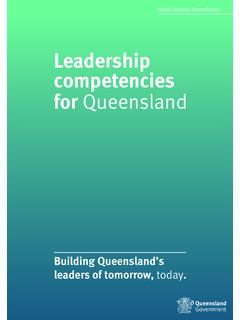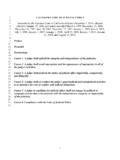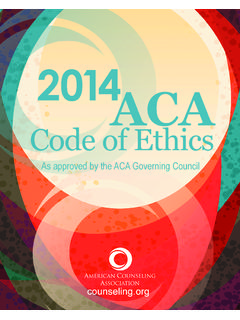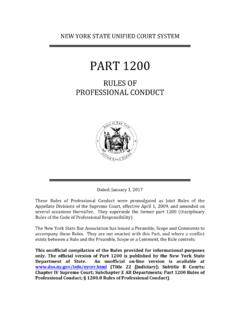Transcription of Code of Conduct
1 Queensland Government code of Conduct For the Queensland Public Service 1 January 2011. The State of Queensland (Public Service Commission) 2010. Published by the Public Service Commission, December 2010, 53 Albert Street, Brisbane Qld 4000. The Queensland Government supports and encourages the dissemination and exchange of information. However, copyright protects this document. The State of Queensland has no objection to this material being reproduced, made available online or electronically but only if it is recognised as the owner of the copyright and this material remains unaltered. Copyright enquiries about this publication should be directed to the Public Service Commission, by email to or in writing to PO Box 15190, City East Qld 4002.
2 Table of contents Application 2. How this code works 3. Using this code 4. All employees 4. Chief Executive and Senior Executive Service Officers 4. Managers and supervisors 4. Upholding this code 4. Principle and values 5. 1. Integrity and impartiality 5. Commit to the highest ethical standards 5. Manage conflicts of interest 5. Contribute to public discussion in an appropriate manner 6. Manage participation in external organisations 6. Demonstrate a high standard of workplace behaviour and personal Conduct 7. 2. Promoting the public good 8. Commit to excellence in service delivery 8. Ensure appropriate community engagement 9. Work as an integrated service 9.
3 3. Commitment to the system of government 10. Commit to our roles in public service 10. Maintain appropriate relationships with Ministerial staff 11. Ensure proper communication with Members of Parliament 11. 4. Accountability and transparency 12. Ensure diligence in public administration 12. Ensure transparency in our business dealings 13. Ensure appropriate use of official resources, public property and facilities 13. Ensure appropriate use and disclosure of official information 13. Commit to innovation and continuous performance improvement 14. More information 14. code of Conduct for the Queensland Public Service 1. Application This code applies to employees of Queensland public service agencies.
4 Public service agencies are defined under the Public Sector Ethics Act 1994 as: a department a TAFE institute or statutory TAFE institute the administrative office of a court or tribunal, and an entity prescribed by regulation. For the purposes of this document only, employees (other than judicial officials), are defined as: any Queensland public service agency employee whether permanent, temporary, full-time, part-time or casual, and any volunteer, student, contractor, consultant or anyone who works in any other capacity for a Queensland public service agency. The code applies at all times when we are performing official duties including when we are representing the Queensland Government at conferences, training events, on business trips and attending work- related social events.
5 2 code of Conduct for the Queensland Public Service How this code works The code contains the ethics principles and their associated set of values prescribed in the Public Sector Ethics Act 1994. It also contains standards of Conduct for each ethics principle. The ethics principles are: 1 Integrity and impartiality 2 Promoting the public good 3 Commitment to the system of government 4 Accountability and transparency These are the fundamental principles of ethical behaviour essential to robust public sector integrity and accountability and which public sector entities1 must promote in their internal and external relationships. Each principle is strengthened by the set of values describing the behaviour that will demonstrate that principle.
6 The principles and associated values are equally important. The standards of Conduct , contained in the code under each set of principles and values, help us as individuals to understand how we put these principles and values into practice. The standards are not intended to cover every possible scenario, therefore in adhering to the code , we are committed to upholding the intention and spirit of the principles and values. Agency-specific Standards of Practice, as approved by the Public Service Commission Chief Executive can supplement this code . An approved Standard of Practice will apply to that agency's employees in the same way as this code .
7 As well as upholding the principles, values and complying with standards of Conduct set out in this code , we will also comply with all relevant legislation, awards, certified agreements, subsidiary agreements, directives, whole-of-government policies and standards. We will also adhere to the policies, organisational values and organisational documents of our employing agency. Principles Contained in Section 4 of the Public Sector Ethics Act 1994. Basis of good administration. Values Contained in Part 3, Division 2 of the Public Sector Ethics Act 1994. Provides a detailed explanation of the principles. Standards of Conduct Statements that reflect and support the values and principles.
8 1. The Public Sector Ethics Act 1994 applies to public sector entities, including public service departments, agencies and offices, local government organisations and other public sector organisations such as universities. code of Conduct for the Queensland Public Service 3. Using this code The code describes how we will Conduct ourselves in delivering services to the Queensland community. An ethical culture in public service agencies starts with our Chief Executive Officers and is demonstrated through our senior leaders and all employees. All employees We take personal responsibility to uphold this code and demonstrate the principles and values of the Public Sector Ethics Act 1994 by the way we perform our duties.
9 This code recognises that we can all demonstrate ethical leadership in how we perform our role, and is a statement of our commitment to the people of Queensland, their elected representatives and our colleagues. Chief Executive and Senior Executive Service Officers As our senior leaders, Chief Executive and Senior Executive Service (SES) Officers have a responsibility to visibly demonstrate and uphold the principles and values of the Public Sector Ethics Act 1994. Chief Executive and SES officers' roles are to promote an organisational culture that values high ethical standards and behaviour. Chief Executive and SES officers openly demonstrate their conscious commitment to ethics by communicating the importance of ethical decision-making in the workplace, and promoting ethical behaviour in day-to-day actions.
10 Chief Executive and SES officers also ensure employees have access to training in the operation of this code and in ethical decision-making more broadly, making the code meaningful for all employees. Managers and supervisors Managerial behaviour sets the tone for the Conduct of all employees. Managers and supervisors have a responsibility to model and promote this code . Managers have the ability to influence others by fostering an ethical environment and demonstrate this awareness in performing their duties and in making decisions. Managers ensure public service employees understand the code , and any other relevant legislation, delegations, policies or other information required to satisfactorily perform our duties.















